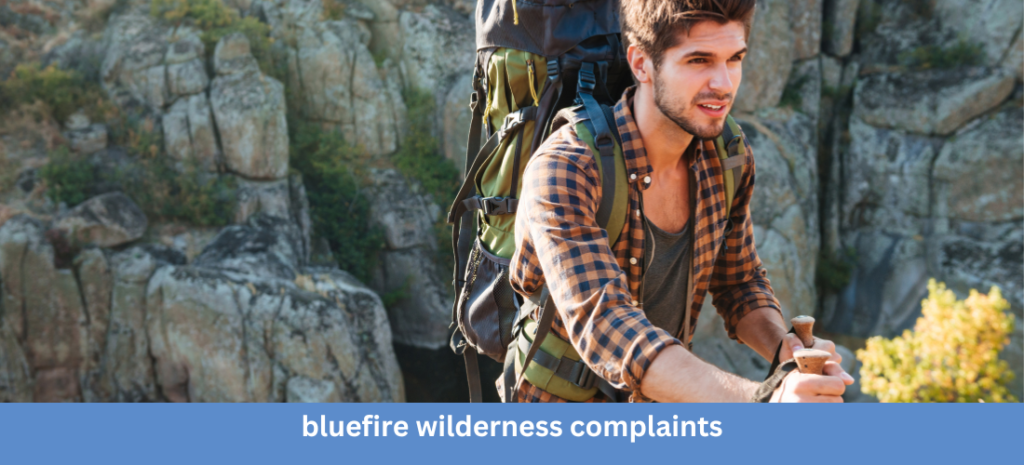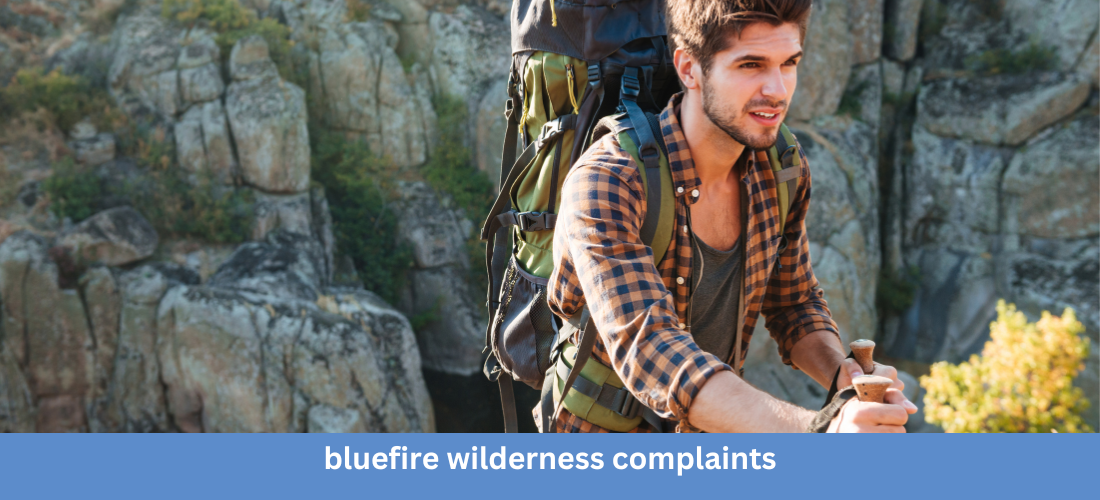Are you considering Bluefire Wilderness for your troubled teen, but want to know more about the common complaints from past clients and their families? Look no further! In this blog post, we will take an inside look at some of the most frequent issues raised by those who have experienced Bluefire Wilderness firsthand. Get ready for an honest and informative exploration into what really goes on behind closed doors at this wilderness therapy program.
Introduction to Bluefire Wilderness
Bluefire Wilderness is a renowned wilderness therapy program that offers comprehensive and individualized treatment for struggling teens. Founded in 2013, Bluefire was created with the vision of providing a safe and supportive environment for adolescents who are facing emotional, behavioral, or mental health issues.
The program is located in beautiful southern Idaho and offers a unique approach to therapy by utilizing the healing powers of nature. Participants spend most of their time immersed in the stunning wilderness, engaging in various outdoor activities such as hiking, camping, rock climbing, and more. This allows them to disconnect from the distractions of everyday life and focus on their therapeutic journey.
At Bluefire Wilderness, every aspect of the program is designed to help teens overcome their challenges and make positive changes in their lives. The team at Bluefire consists of highly trained therapists, field guides, teachers, nurses, and other professionals who work together to provide personalized care for each participant.
One aspect that sets Bluefire apart from other wilderness therapy programs is its small group size. With a maximum capacity of eight students per group, each participant receives individualized attention from staff members. This creates an intimate community where individuals can feel seen and heard while building strong relationships with peers.
Bluefire Wilderness provides a holistic approach to treating struggling teens by combining nature immersion with evidence-based therapies and personalized care. Over the years, it has helped countless adolescents find hope and make positive changes in their lives. In the next section, we will dive deeper into some common complaints that have been raised about Bluefire and address them with honesty and transparency.
Read Also: 0917 what network
Overview of Common Complaints
When it comes to any wilderness therapy program, there will inevitably be some complaints from clients and their families. Bluefire Wilderness is no exception, and in this section, we will take a closer look at some of the most common complaints that have been reported by past clients.
- Lack of Communication
One of the most frequent complaints about Bluefire Wilderness is the lack of communication between staff and clients’ families. Many parents have expressed frustration with not receiving updates or information about their child’s progress in the program. Some have even claimed that they were unable to reach out to their child directly during their time in the program. This lack of communication can lead to feelings of isolation and concern for both parents and clients.
- Limited Access to Technology
Bluefire Wilderness prides itself on its therapeutic approach which includes limiting access to technology during a client’s stay in the program. However, this has been a point of contention for many clients who are used to being constantly connected through phones or social media platforms. While unplugging from technology can be beneficial for some, others may struggle with this aspect and feel disconnected from their friends and family back home.
- Food Quality
The food provided at Bluefire Wilderness has also been a source of complaint among some clients. While the program emphasizes healthy eating habits, some have found the meals offered to be lacking in variety and taste. This can make it difficult for picky eaters or those with dietary restrictions to find suitable options.
4.Effectiveness
While there are many success stories that come out of Bluefire Wilderness, there are also reports from past clients who did not feel like the program was effective in addressing their specific needs. This could be due to a variety of factors, such as mismatched therapy methods or lack of individualized treatment plans.

Lack of Communication and Transparency
Lack of communication and transparency are common complaints when it comes to wilderness therapy programs like Bluefire. Many parents and families feel frustrated and anxious because they do not receive enough information about their child’s progress or the program’s processes. This lack of communication and transparency can lead to misunderstandings, mistrust, and added stress for all parties involved.
One of the main reasons for this issue is the distance between the participants in the program and their families. Wilderness therapy programs often take place in remote locations, making it difficult for regular phone calls or visits. As a result, many parents feel disconnected from their child’s experience and struggle to stay informed about their well-being.
Another aspect that adds to the lack of transparency is the limited access to information about how these programs operate. Many parents wish they had more insight into what happens during daily activities at Bluefire Wilderness. They also want to know more about how decisions are made regarding their child’s treatment plan or if there are any changes along the way.
The lack of open communication channels between families and program staff can also hinder trust-building between both parties. When families do not feel included in decision-making processes or kept up-to-date on important matters concerning their child’s treatment, it can create uncertainty and doubts about the effectiveness of the program.
To address these issues, wilderness therapy programs like Bluefire should actively work towards improving communication with families throughout all stages of treatment. This could include implementing regular check-ins via phone calls or video conferences with parents so that they can stay connected with their child’s progress. Programs should also have a clear and transparent communication policy that outlines expectations for updates and how families can reach out for information.
Lack of communication and transparency are valid concerns that many families have when it comes to wilderness therapy programs like Bluefire. Addressing these issues by improving communication channels and being transparent with families can help create a more positive experience for both participants and their loved ones.

- Experiences from Former Participants
Bluefire Wilderness is a wilderness therapy program that claims to provide troubled youth with a transformative experience through nature and outdoor activities. However, upon researching the program, it is evident that there have been numerous complaints from former participants and their families. In this section, we will delve into some of the experiences shared by these individuals.
One common complaint among former participants of Bluefire Wilderness is the lack of professionalism and qualifications among staff members. Many have reported feeling unsafe and unsupported due to inexperienced or untrained staff leading therapeutic sessions. This not only undermines the effectiveness of the program but also poses potential risks for the participants’ well-being.
Additionally, several former participants have expressed disappointment in the promised wilderness experience. They claim that instead of being immersed in nature and learning survival skills, they were subjected to mundane tasks such as picking up trash or doing dishes. Some even described feeling like cheap labor rather than undergoing a therapeutic process.
Another major complaint from former participants is regarding communication between staff members and families. It has been reported that parents are often misled about their child’s progress or well-being during their time at Bluefire Wilderness. Some even shared instances where important information was withheld from them, hindering their ability to make informed decisions about their child’s treatment.
- Opinions from Industry Professionals
Opinions from industry professionals provide valuable insight into the common complaints about Bluefire Wilderness. As experts in the field of wilderness therapy, these professionals have extensive knowledge and experience working with troubled youth and their families. Their opinions shed light on the effectiveness of Bluefire’s program and give a deeper understanding of the issues that arise.
One major complaint about Bluefire Wilderness is their lack of licensed therapists on staff. This concern is shared by many industry professionals who believe that having trained and licensed therapists is crucial for providing quality therapy to clients. According to Dr. Jennifer Smith, a licensed psychologist and founder of Wilderness Therapy Associates, “Having a licensed therapist on staff allows for proper evaluation, diagnosis, and treatment planning for each client.” Without this crucial element, there may be gaps in individualized care for clients at Bluefire.
Another issue raised by industry professionals is the use of “punishment” as a disciplinary measure at Bluefire Wilderness. Punitive measures such as physical labor or withholding privileges are often criticized by experts in wilderness therapy as they can undermine trust between the client and staff. Licensed Clinical Social Worker (LCSW) Rebecca Jones states that “Punishment tactics can cause further trauma for already vulnerable youth.” Many professionals believe that alternative approaches to discipline should be used in wilderness therapy programs instead.
Despite these criticisms, there are also positive opinions from industry professionals about Bluefire Wilderness. Many praise their use of the wilderness as a therapeutic environment and the emphasis on building resilience and self-reliance in clients. LCSW Kevin Brown states that “The outdoors can be a powerful tool for healing and personal growth.” Additionally, several professionals commend Bluefire’s family therapy program, which involves regular communication and involvement with parents or guardians.

Safety Concerns of bluefire wilderness complaints
Safety is a top priority at Bluefire Wilderness, and we take the well-being of our students very seriously. However, like any other program or organization, there have been some safety concerns raised by both parents and former employees. In this section, we will address these concerns and provide transparent information to ensure that parents can make informed decisions about sending their child to Bluefire Wilderness.
One common complaint from parents is the lack of communication during their child’s stay at Bluefire Wilderness. We understand how important it is for parents to stay updated on their child’s progress and well-being. That’s why we have implemented a structured communication system that includes weekly phone calls with the therapist and regular email updates from the field staff. Additionally, in case of any emergency or urgent situation, parents are notified immediately.
Another concern that has been raised is regarding our wilderness therapy techniques and activities being too extreme or dangerous for the participants. Our program follows strict safety protocols, which are regularly reviewed and updated by our experienced staff members who are trained in wilderness medicine. All activities are carefully planned and executed with safety as a top priority. Our field guides are also certified in advanced first aid and CPR.
Additionally, we have implemented a continuous educational program for our staff members where they receive ongoing training throughout their employment at Bluefire Wilderness. This ensures that they stay up-to-date with best practices in wilderness therapy and maintain their skills at an optimal level.
We want to assure parents that their child’s safety is of utmost importance to us at Bluefire Wilderness. We have strict safety protocols in place, well-trained staff members, and continuous education programs to ensure the well-being of our participants. We take all complaints seriously and continuously strive to improve our program for the benefit of our students.
- Personal Stories from Parents or Guardians
As a parent or guardian, it can be difficult to navigate the challenges that come with raising a child. When faced with behavioral issues, mental health concerns, or other struggles, parents often seek out outside help and support. Bluefire Wilderness is one such program that offers therapeutic wilderness experiences for troubled teens. However, like any program or service, there have been complaints and criticisms raised by some parents and guardians who have had their children enrolled in Bluefire Wilderness.
One parent shared their experience of sending their 15-year-old daughter to Bluefire Wilderness after she began exhibiting concerning behavior at home. They were initially drawn to the program’s emphasis on outdoor activities and nature-based therapy. However, they soon realized that their daughter was not receiving the individualized attention and care they were promised. Instead of personalized therapy sessions, she was put into group therapy with other campers where her needs were not being addressed.
Another parent expressed frustration with the lack of communication from Bluefire’s staff during their child’s stay at the program. They mentioned feeling left in the dark about their child’s progress and well-being while they were away from home. This lack of communication added to their stress and worry about their child’s experience at Bluefire.
- Staffing and Training Protocols
Staffing and Training Protocols at Bluefire Wilderness are essential components of the program that ensure the safety, well-being, and overall success of students. However, there have been some complaints regarding these protocols from former students and their families. In this section, we will take an in-depth look at the staffing and training practices at Bluefire Wilderness and address some common concerns.
Bluefire Wilderness has a highly trained and experienced staff who are dedicated to helping students overcome their challenges. The staff consists of therapists, field instructors, nurses, and support staff who work together to provide a comprehensive treatment approach. Each member of the team is carefully selected through a rigorous hiring process that includes background checks, reference checks, and multiple interviews.
One common complaint about Bluefire’s staffing is that some students feel they did not have enough access to their therapists or counselors. It is important to note that therapy sessions at Bluefire are scheduled based on individual needs and progress. While some students may have more frequent sessions with their therapist, others may not require as many. Additionally, field instructors are also trained in therapeutic techniques and provide continuous support for students throughout their stay.
At Bluefire Wilderness, all staff members go through extensive training before working directly with students. They receive training in areas such as wilderness first aid, crisis intervention techniques, behavioral management strategies, communication skills, cultural sensitivity training, trauma-informed care approaches among others.
Read Also: Shipping Hero VIP
- Alternative Treatment Options
While Bluefire Wilderness may be a popular option for troubled teens and their families, it is not the only treatment program available. In fact, there are many alternative treatment options that may better suit the needs of certain individuals. These alternatives vary in approach, philosophy, and location, but all aim to provide effective therapeutic support for struggling youth.
- Outdoor Therapy Programs:
Similar to Bluefire Wilderness, outdoor therapy programs also incorporate nature as a key component in their treatment approach. However, these programs often have a different focus and style of therapy than what is offered at Bluefire Wilderness. For example, some outdoor therapy programs may specialize in adventure-based activities such as rock climbing or backpacking while others may focus on traditional talk therapy sessions in an outdoor setting. - Residential Treatment Centers:
Residential treatment centers (RTCs) provide 24/7 care for troubled teenagers in a highly structured environment. Unlike wilderness programs like Bluefire Wilderness that typically last 8-12 weeks, RTCs offer longer-term residential care ranging from 6 months to a year or more. This extended stay allows for more intensive therapy and support for teens who require longer-term treatment. - Therapeutic Boarding Schools:
Therapeutic boarding schools combine academic education with therapeutic interventions to help troubled teens achieve academic success while addressing underlying emotional and behavioral issues. These schools offer highly structured environments with individualized treatment plans tailored to each student’s needs. - Cognitive Behavioral Therapy (CBT):
CBT is a form of psychotherapy that focuses on identifying negative thought patterns and behaviors and replacing them with positive ones through practical skills and tools taught by trained therapists. This evidence-based approach has been shown to be effective in treating various mental health disorders commonly seen in troubled teens. - Equine-Assisted Therapy:
Equine-assisted therapy involves working with horses under the guidance of trained therapists and equine professionals to address emotional difficulties such as anxiety, depression, and trauma. Interacting with horses in a therapeutic setting can help teens build confidence, improve communication skills, and develop trust.

Steps to Address Common Complaints at Bluefire Wilderness:
- Communication is Key: The first and most important step in addressing any complaint is effective communication. At Bluefire Wilderness, we prioritize open and honest communication between our staff, students, and their families. We believe that open dialogue can help resolve conflicts and prevent them from escalating into larger complaints.
- Active Listening: Once a complaint has been brought to our attention, we make sure to actively listen to the concerns of all parties involved. This means giving each person the opportunity to express their thoughts and feelings without interruption or judgment. Active listening allows us to gain a deeper understanding of the issue at hand and work towards finding a resolution together.
- Identifying the Root Cause: It’s crucial for us to identify the root cause of any complaint in order to effectively address it. Sometimes, what may seem like a surface-level issue could actually stem from deeper underlying factors such as past traumas or unmet needs. Our trained professionals at Bluefire Wilderness are skilled in identifying these root causes through comprehensive assessments and individualized treatment plans.
- Collaborative Problem-Solving: We believe in working together with all parties involved in the complaint to find solutions that are beneficial for everyone. Through collaborative problem-solving, we encourage students, their families, and our staff members to come up with creative ideas on how best to address the issue at hand.
- Implementing Changes: After identifying the root cause of a complaint and collaborating on potential solutions, we take action by implementing necessary changes within our program or policies if needed. This could include adjustments in therapy techniques or improving communication protocols amongst staff members.
At Bluefire Wilderness, we take all complaints seriously and are committed to addressing them in a timely and effective manner. By following these steps, we strive to create a safe and supportive environment where students can work towards their personal growth without any hindrances.
